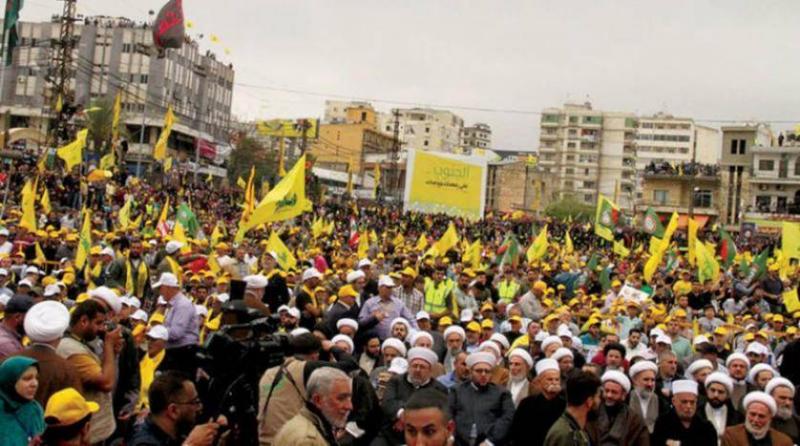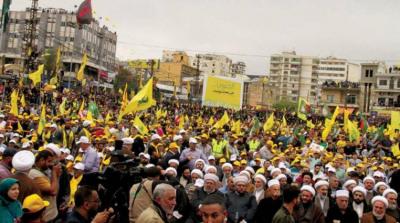Hezbollah and its allies in Lebanon rely on well-known slogans in their electoral campaigns, often bordering on accusations of treason, which has become more evident lately with the intensification of election campaigns in the speeches by their officials urging their voters to participate in the elections. Some have gone so far as to frame the electoral battle as a "regional confrontation," deeming "voting a jihadist duty" and a "worship opportunity," according to their expressions.
Every occasion that Hezbollah and Amal Movement officials participate in is filled with electoral rhetoric; for instance, Amal's leader, Parliament Speaker Nabih Berri, previously described the elections as "one of the most important and dangerous electoral deadlines since the Taif Agreement until now," discussing "external interventions cloaked in attractive labels, the most blatant of which are the exposed attempts to take cheap advantage of people's suffering, crises, livelihoods, and legitimate demands."
Dr. Mona Fayyad, a university professor and an opposition activist against Hezbollah within the Shia community, considers that for the "duo," the elections today are a matter of "life or death," with their efforts aimed at securing a parliamentary majority to control the country for the next thirty years. Thus, their reliance on this rhetoric undoubtedly stems from their fear of a shift in public sentiment amidst the crisis affecting everyone in Lebanon, impacting their community as well as all others.
Despite the assurances from Hezbollah and Amal officials about the "strength of the duo," especially in areas known to favor them, such as the south and Bekaa Valley, their call for voter participation resembles a "religious duty," which some view as a fear of an expanding opposition presence in these regions. This "duty" was articulated yesterday by Hani Qbisi, a member of Amal Movement, who counted participation in the parliamentary elections as "a fundamental jihadist matter to preserve Lebanon's reality, resistance, and unity against all conspirators." The same sentiment was echoed by Hezbollah's political council head, Ibrahim Amin al-Sayyid, last Monday, stating that "the elections, before being a political opportunity and position, are a worship opportunity, just as you pray in the mosque, and just as you fast in Rajab, Sha'ban, and Ramadan, you must go to the ballot boxes because voting is like praying in mosques."
Dr. Fayyad confirms in her conversation with Asharq Al-Awsat that "the methods and pressures used by the duo, including the 'religious duty' and the provision of aid, are not new; they resort to them during every electoral process to ensure the maximum possible participation from their audience, a substantial part of whom adheres to this duty." While acknowledging the difficulty of confronting the duo in particular and parties in general, she believes that the challenge or "hope" remains in preventing any party from gaining a majority, thus fragmenting the parties in parliament.
While Hezbollah insists on portraying the election battle as regional against its weaponry, Sheikh Ali Daamoush, the deputy head of Hezbollah's executive council, stated yesterday that the confrontation is not with "the tools of the interior" in Lebanon. He said, "The tools and affiliates are too weak to confront Hezbollah and the resistance in the parliamentary elections, and the real electoral battle is not with them; rather, it is with their masters (...) who are using all their media, financial capabilities, blockades, sanctions, and starvation to break the resistance and distance people from it, betting at the very least on a low turnout and lack of interest in the ballot boxes."
Dr. Fayyad comments on the effort to depict the battle as regional and a confrontation with the "masters of the interior," stating: "They speak of masters for others when no one has masters but them, by their own acknowledgment, and no one has used weapons against their opponents as they have done, thus what they are doing is nothing more than propaganda and lies."
Yesterday, the leaderships of Hezbollah and the Amal Movement held a unified meeting in the southern region, where elections were a central theme of discussion, particularly regarding social aids that in Lebanon turn into "electoral bribes" during the election season. A statement issued by both parties highlighted their focus "on the measures, programs, and offerings adopted to alleviate the burdens on our people in facing the living and financial crisis plaguing the homeland, and reviewed the latest preparations for the upcoming parliamentary elections," calling for acceptance of the Iranian offer that resolves the electricity problem, reiterating "the necessity of conducting them on time while renewing the announcement of the deep alliance between Hezbollah and the Amal Movement, which is a guarantee for the stability of the homeland, its sovereignty, and the freedom of its people against all attempts at hegemony, dependency, and normalization." They also called for "active and massive participation in these elections for their importance in shaping Lebanon's future and preserving its resistance as a choice to deter enemies and dismantle all their conspiracies and projects."




